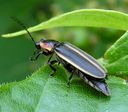Photinus indictus
Classification
- Phylum: Arthropoda
- Subphylum: Hexapoda
- Class: Insecta
- Order: Coleoptera
- Suborder: Polyphaga
- Superfamily: Elateroidea
- Family: Lampyridae
- Subfamily: Lampyrinae
- Tribe: Lucidotini
- Genus: Photinus
- Species: indictus
Pronunciation
How to pronounce Photinus indictus: //foʊˈtaɪnəs ɪnˈdɪktəs//
These audio files are automatically generated. While they are not always 100% accurate, they are a good starting point.
Images


Summary
Photinus indictus, known as the silent firefly, is a diurnal firefly species in the beetle family Lampyridae that is found in eastern North America. It lacks lanterns on its abdomen and is known for its unique coloration and behavior.
Physical Characteristics
Adults approximately 6–10 mm (0.2–0.4 in) long; head shield pale yellow with a thick black rectangular central mark bordered by red or pink; elytra dark with wide, well-defined light-colored margins; males and females lack lanterns on their abdomen.
Identification Tips
Distinguished from other fireflies by lack of lanterns and the specific coloration of the pronotum and elytra.
Habitat
Found in meadows, pastures, and fields.
Distribution
Eastern North America, most commonly in the Great Lakes region of the United States and Canada.
Diet
Larvae feed on snails, worms, and other soft-bodied invertebrates.
Life Cycle
Undergoes four life stages: egg, larva, pupa, and adult. Larvae are bioluminescent and likely live below the soil surface.
Reproduction
Adults attract mates through airborne pheromones; specific details on mating behavior not detailed.
Ecosystem Role
As a part of the biodiverse beetle community, likely plays a role in the control of soft-bodied invertebrate populations.
Cultural Significance
Commonly known as the silent firefly, referenced in studies of bioluminescence and biodiversity.
Misconceptions
Often mistaken for other fireflies due to its appearance, but it does not exhibit bioluminescence as an adult.
Tags
- firefly
- beetle
- Lampyridae
- Photinus
- eastern North America
- bioluminescence
- insect